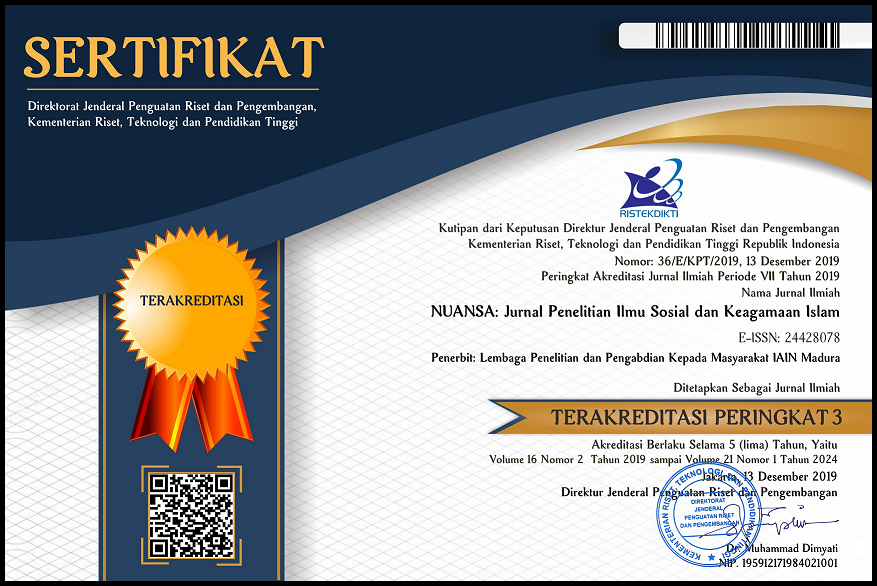Dunia tanpa Islam: Pergulatan Wacana Seputar Agama sebagai Sumber Konflik di Indonesia
 Abstract views: 441
,
Abstract views: 441
,
 PDF downloads: 310
PDF downloads: 310
Abstract
Although there is a lot of legitimacy that says no religion teaches hostility, in reality, conflict often colors religious life. The number of conflicts that arose and were related to religion has finally brought academic discourse to a struggle among thinkers related to the discourse of religion as a source of conflict. This article highlights the conflicts in Indonesia due to the discourse of thinkers. The article explores several related literature to illustrate how the discourse is debated. Some Qur'anic verses and their interpretations are also included to emphasize the author's argument and positioning in the discourse. At the national level, domestic thinkers are divided into two camps between those who say religion is a source of conflict and those who do not. At the international level, this discourse even reaches the assumption of religion, especially Islam, as a threat. Some Western thinkers have also proposed the idea of a world without Islam or even without religion. This article concludes that religious conflicts contain many complex elements so that religion cannot necessarily be used as a scapegoat for all problems. Moreover, the behavior of religious people will determine the face of religion in society, so improving religious behavior is the key rather than thinking of eliminating religion itself.
Downloads
References
Assyaukanie, Luthfi. “Akar-akar Intoleransi dan Diskriminasi di Indonesia.” Maarif 13, no. 2 (2018).
Dawkins, Richard. The God Delusion. Terjemah Zaim Rofiqi, Jakarta: Banana, 2013.
Djafar, Alamsyah M. Ringkasan Eksekutif. Tawar-menawar Kebebasan: Satu Dekade Pemantauan Kemerdekaan Beragama Berkeyakinan (KBB) Wahid Foundation. Jakarta: Wahid Foundation, 2020.
Febrianti Y.S., Febby. “Agama, Ritual, dan Konflik: Suatu Upaya Memahami Konflik Internal Umat Beragama di Indonesia.” Handep 2, no. 2 (2019).
Frazer, Owen & Richard Friedli. Approaching Religion in Conflict Transformation: Concepts, Cases and Practical Implications, Zurich: Center for Security Studies, 2015.
Fuller, Graham E.. A World Without Islam. Terjemah T. Hermaya. Bandung: Mizan Pustaka, 2014.
Institute of Economics & Peace. Five Key Questions Answered on The Link Between Peace & Religion. New York: Institute of Economics & Peace, 2014.
Jailani, Imam Amrusi. “Pergolakan Politik Antara Tokoh Muslim Dan Nasionalis Dalam Penentuan Dasar Negara Republik Indonesia.” Karsa 22, no. 2 (2014).
Jauharī, Tanthāwī. Al-Jawāhir fī Tafsīr Al-Qur.’an al-Karīm. Jilid 22-21. Beirut: Dar al-Kutub al-Ilmiyah, 2004.
Lestari, Yeni Sri. “Politik Identitas di Indonesia: Antara Nasionalisme dan Agama.” Journal of Politics and Policy 1, no. 1 (2018).
Marāghī (al), Ahmad Mustafa. Tafsīr al-Marāghī. Juz 20. Kairo: Maktabah Wa Mathba’ah Mustafa al-babi, 1946.
Munawar-Rachman, Budhy. Islam dan Liberalisme, Jakarta: Friedrich Naumann Stiftung, 2011.
Prasojo, Zaenuddin Hudi & Pabbajah, Mustaqim. “Akomodasi Kultural dalam Resolusi Konflik Bernuansa Agama di Indonesia.” Jurnal Aqlam: Journal of Islam and Plurality 5, no. 1 (2020).
Pusat Kerukunan Umat Beragama Departemen Agama Republik Indonesia. Menejemen Konflik umat Beragama, Jakarta: Departemen Agama RI, 2007.
Puslitbang Bimbingan Masyarakat Agama dan Layanan Keagamaan Badan Litbang dan Diklat Kementrian Agama RI, Indeks Kerukunan Umat Beragama di Indonesia 2021.
Rahman, M. Taufiq. Agama dan Politik Identitas dalam Kerangka Sosial. Bandung: Prodi S2 Studi Agama-Agama UIN Sunan Gunung Djati Bandung, 2020.
Rāzī (al), Muhammad Fakhruddīn, Tafsīr al-Fakhru al-Rāzī. Beirut: Dar Al-Fikr, 1981.
Retnowati. “Agama, Konflik dan Integrasi Sosial Refleksi Kehidupan Beragama di Indonesia: Belajar dari Komunitas Situbondo Membangun Integrasi Pasca Konflik.” Sangkep 1, no. 1 (2018).
Riyadi, Abdul Kadir. “Kajian atas Wacana Tasawuf dan Keutuhan Sosial Ernest Gellner”. Dalam Teosofi: Jurnal Tasawuf dan Pemikiran Islam. Vol. 8, No. 2 (2018).
Schliesser, Christine, S. Ayse Kadayifci-Orellana, & Pauline Kollontai. On The Significance of Religion in Conflict and Conflict Resolution. New York: Routledge, 2021.
SETARA Institut. “Mengatasi Intoleransi, Merangkul Keberagaman: Kondisi Kebebasan Beragama/Berkeyakinan (KBB) di Indonesia Tahun 2021.” Laporan Kebebasan Beragama/Berkeyakinan (KBB). Jakarta, 10 Februari 2021.
Sirry, Mun’im. “Kekerasan dalam Al-Qur.’an Bukan Problem Interpretasi.” Geotimes. Jum’at, 10 Februari 2017.
___________. Membendung Militansi Agama: Iman dan Konflik dalam Masyarakat Modern. Jakarta: Erlangga, 2021.
Syarif, Fajar. “Religion in The Conflict Flows.” Addin 13, no. 2 (2019).
Syukron, Buyung. “Agama dalam Pusaran Konflik (Studi Analisis Resolusi Terhadap Munculnya Kekerasan Sosial Berbasis Agama di Indonesia).” Ri’ayah 2, no. 1 (2017).
Takdir, Mohammad. “Identifikasi Pola-Pola Konflik Agama dan Sosial: Studi Kasus Kekerasan Berbasis Sektarian dan Komunal di Indonesia.” Ri’ayah 2, no. 01 (2017).
Tim Penyusun Ditjen Bimas Islam Kementrian Agama. Moderasi Beragama Prespektif Bimas Islam. Jakarta: Sekretariat Ditjen Bimas Islam Kementrian Agama, 2022.
United States Commission on International Religious Freedom. Annual Report 2021.
Utoyo, Marsudi. “Akar Masalah Konflik Keagamaan di Indonesia.” Jurnal Lex Librum 3, no. 1 (2016).
Voas, David & Bruce, Steve. “Religion: Identity, Behavior and Belief Over Decades.” British Social Attitudes 36. London: The National Centre for Social Research, 2019.
Wahid, Marzuki. “Anomali Agama dan Politik: Fenomena Regulasi Bernuansa Islam.” Agama dan Kontestasi Ruang Publik: Islamisme, Konflik, dan Demokrasi. Ed. Badrus Samsul Fata. Jakarta: The Wahid Institute, 2011.
Wijaya, Aksin. Dari Membela Tuhan ke Membela Manusia. Bandung: Mizan, 2018.
Yunus, Firdaus M. “Konflik Agama di Indonesia; Problem dan Solusi Pemecahannya.” Substantia 16, no. 2 (2014).
Yusdani. “Pengelolaan Konflik Umat Agama di Indonesia.” Millah 12, no. 2 (2013).
Copyright (c) 2024 NUANSA: Jurnal Penelitian Ilmu Sosial dan Keagamaan Islam

This work is licensed under a Creative Commons Attribution-NonCommercial 4.0 International License.
The journal operates an Open Access policy under a Creative Commons Attribution-NonCommercial 4.0 International License (CC-BY-NC) 
Authors who publish with this journal agree to the following terms:
- Authors retain copyright and grant the journal right of first publication with the work simultaneously licensed under a Creative Commons Attribution License that allows others to share the work with an acknowledgement of the work's authorship and initial publication in this journal.
- Authors are able to enter into separate, additional contractual arrangements for the non-exclusive distribution of the journal's published version of the work (e.g., post it to an institutional repository or publish it in a book), with an acknowledgement of its initial publication in this journal.
- Authors are permitted and encouraged to post their work online (e.g., in institutional repositories or on their website) prior to and during the submission process, as it can lead to productive exchanges, as well as earlier and greater citation of published work.





















